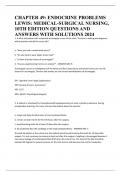-
1. Exam (elaborations) - Lewis test bank questions and answers with solutions 2024
-
2. Exam (elaborations) - Lewis med-surg test-bank! chapter 45 questions and answers with solutions 2024
-
3. Exam (elaborations) - Lewis med surg. ch. 12 questions and answers with solutions 2024
-
4. Exam (elaborations) - Ch. 44: nutrition problems test bank questions and answers with solutions 2024
-
5. Exam (elaborations) - Lewis medical surgical nursing chap 69: arthritis and connective tissue disorders que...
-
6. Exam (elaborations) - Lewis's chapter 28 (12 edition) questions and answers with solutions 2024
-
7. Exam (elaborations) - Lewis's medical surgical nursing 11th edition harding test bank questions and answe...
-
8. Exam (elaborations) - Lewis: medical-surgical nursing~chapter 17 questions and answers with solutions 2024
-
9. Exam (elaborations) - Lewis medical surgical nursing chap 50: renal and urologic problems questions and ans...
-
10. Exam (elaborations) - Normal lab values - lewis 12th edition questions and answers with solutions 2024
-
11. Exam (elaborations) - Lewis - ch 53 questions and answers with solutions 2024
-
12. Exam (elaborations) - Lewis medical surgical nursing: chap 46 upper gi problems questions and answers with ...
-
13. Exam (elaborations) - Cardiac lewis test bank questions and answers with solutions 2024
-
14. Exam (elaborations) - Chapter 55: assessment of nervous system lewis: medical-surgical nursing, 10th editio...
-
15. Exam (elaborations) - Lewis med surg chapter 40 - nursing management obesity questions and answers with sol...
-
16. Exam (elaborations) - Chapter 25: assessment of respiratory system lewis: medical-surgical nursing, 10th ed...
-
17. Exam (elaborations) - Chapter 53: female reproductive and genital problems lewis: medical-surgical nursing...
-
18. Exam (elaborations) - Chapter 28: obstructive pulmonary diseases lewis: medical-surgical nursing, 10th edi...
-
19. Exam (elaborations) - Lewis chapter 42: nursing management: lower gastrointestinal problems questions and a...
-
20. Exam (elaborations) - Chapter 19: postoperative care lewis: medical-surgical nursing, 10th edition question...
-
21. Exam (elaborations) - Lewis chapter 42: nursing management: lower gastrointestinal problems questions an...
-
22. Exam (elaborations) - Chapter 64: arthritis and connective tissue diseases lewis: medical-surgical nursin...
-
23. Exam (elaborations) - Chapter 65: critical care lewis: medical-surgical nursing, 10th edition questions and...
-
24. Exam (elaborations) - Chapter 30: nursing management: lower respiratory problems lewis et al.: medical-surg...
-
25. Exam (elaborations) - Chapter 68: emergency and disaster nursing lewis: medical-surgical nursing, 10th edit...
-
26. Exam (elaborations) - Chapter 57: stroke lewis: medical-surgical nursing, 10th edition questions and answer...
-
27. Exam (elaborations) - Chapter 35: dysrhythmias lewis: medical-surgical nursing, 10th edition questions and ...
-
28. Exam (elaborations) - Chapter 52: assessment and management of patients with endocrine disorders questions ...
-
29. Exam (elaborations) - Lewis med-surg ch. 33 cad and acute coronary syndrome questons and answers with solut...
-
30. Exam (elaborations) - Chapter 47: assessment of endocrine system lewis: medical-surgical nursing, 10th edit...
-
31. Exam (elaborations) - Lewis med surg ch. 9 – pain questions and answers with solutons 2024
-
32. Exam (elaborations) - Chapter 26: upper respiratory problems lewis: medical-surgical nursing, 10th edition ...
-
33. Exam (elaborations) - Chapter 66: shock, sepsis, and multiple organ dysfunction syndrome lewis: medical-sur...
-
34. Exam (elaborations) - Chapter 31: assessment of cardiovascular system lewis: medical-surgical nursing, ques...
-
35. Exam (elaborations) - Chapter 37: vascular disorders lewis: medical-surgical nursing, 10th edition question...
-
36. Exam (elaborations) - Lewis chapter 18: intraoperative care questions and answers with solutions 2024 lewi...
-
37. Exam (elaborations) - Chapter 16: fluid, electrolyte, and acid-base imbalances lewis: medical-surgical nurs...
-
38. Exam (elaborations) - Lewis heart failure bank questions and answers with solutions 2024
-
39. Exam (elaborations) - Lewis chapter 62: musculoskeletal trauma and orthopedic surgery questions and answers...
-
40. Exam (elaborations) - Ch.25, 26, 27, & 28 lewis respiratory questions and answers with solutions 2024
-
41. Exam (elaborations) - Lewis ch. 25 - assessment of respiratory system questions and answers with solutions ...
-
42. Exam (elaborations) - Chapter 49: endocrine problems lewis: medical-surgical nursing, 10th edition question...
-
43. Exam (elaborations) - Hinkle chapter 65 test bank - parkinsons only questions and answers with solutions 20...
-
Show more




